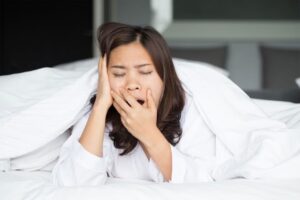The human sleep-wake cycle is hardwired so that exposure to light promotes alertness. However, sometimes people may paradoxically find that they feel tired after being out in the sunshine. Although people commonly feel tired in the sun, the sun is not necessarily always to blame. Multiple factors can cause sleepiness on a sunny day.
We explore the many reasons a summer afternoon might prompt tiredness instead of alertness, as well as tips for fighting fatigue when you feel the urge to sleep on sunny days.
You Are Fighting to Keep Cool
The human body engages in thermoregulation, a process in which it continuously works to maintain a consistent internal temperature of about 98.6 degrees Fahrenheit. Sunny days are often also warm or hot days, and warmer weather requires the body to do more work as it regulates its temperature. For example, you may produce sweat or pump warm blood to the skin to help cool down your core. These efforts use energy.
Overly warm temperatures or strenuous exercise may tax the thermoregulation process and lead to fatigue. In more extreme cases fatigue may be a symptom of heat illness, or hyperthermia, which occurs when the body overheats and cannot properly regulate its temperature.
You Are Dehydrated
The body uses fluids as it cools itself, which means you might need to drink more liquids to avoid dehydration on a warm day. Insufficient fluid intake can force the heart to work harder, and tiredness is a common symptom of dehydration.
You Are Exercising
A sunny day might seem like the perfect time to go for a run or exercise outdoors, but exercise itself can induce physical and mental fatigue. Sleepiness felt after outdoor exercise in the sun could be more due to the exercise than the sun, or a result of exercising in hot temperatures.
Because exercise heats the body and leads to increased fluid use, exercising in warmer temperatures makes dehydration and trouble with body temperature regulation more likely. Both these processes can prompt tiredness.
Your Immune System Is Activated
Sunlight contains ultraviolet (UV) light, and exposure to this UV radiation can cause sunburn. Results from one older study suggest that regular UV light exposure may contribute to increased mental fatigue.
UV exposure can trigger an immune response as the body tries to protect the skin. In turn, increased immune system activation may contribute to tiredness and the desire for more sleep. More research is needed to confirm, but since sunburn, the immune system, and sleep are interrelated, this may partly explain why being in the sun makes you tired.
You Are Experiencing an Afternoon Slump
Because of the natural human sleep-wake cycle, the time of day when people often feel most tired is in the early afternoon, a period known as the afternoon slump. In many places, the sun is also at its brightest midday and in the afternoon. Sleepiness at this time could be due to the time of day, as well as the other effects associated with warmer weather.
Tips for Staying Alert on Sunny Days
Adopting proactive lifestyle habits may help you feel less tired in the heat.
Stay Hydrated
Drinking plenty of fluids on a warm day helps ward off dehydration and assists the body in cooling itself. In fact, when a person drinks cool liquids, heat transfers into those fluids where it can be released from the body through sweat or urine. Opt for water and avoid alcohol and other diuretics.
Avoid Going Out During the Hottest Parts of the Day
If the heat makes you tired, avoid the worst of it by staying inside during the hottest parts of the day. Avoiding the hottest times is especially important if you are going outside to exercise. Try to time your outdoor activities so you can enjoy the sun during cooler times such as the morning, the late afternoon, or the evening. During heat waves or in places with extremely humid weather, try to seek out air-conditioned spaces.
Take a Short Nap
When sleepiness has more to do with the time of day than the temperature, an afternoon nap might help. A short 10- to 20-minute nap taken during the afternoon slump can increase alertness.
Protect Yourself From the Sun
Loose, long-sleeved shirts and pants, as well as sunscreen reapplied throughout the day, can help protect you from a sunburn.
Know what to look out for so you can act in time to prevent heat illness. Be extra careful in the heat if you are a child, athlete, or older adult. Additionally, you should use caution if you have a pre-existing medical condition or take certain medications.
References
Ask the Sleep Doctor
Have questions about sleep? Submit them here! We use your questions to help us decide topics for articles, videos, and newsletters. We try to answer as many questions as possible. You can also send us an email. Please note, we cannot provide specific medical advice, and always recommend you contact your doctor for any medical matters.


